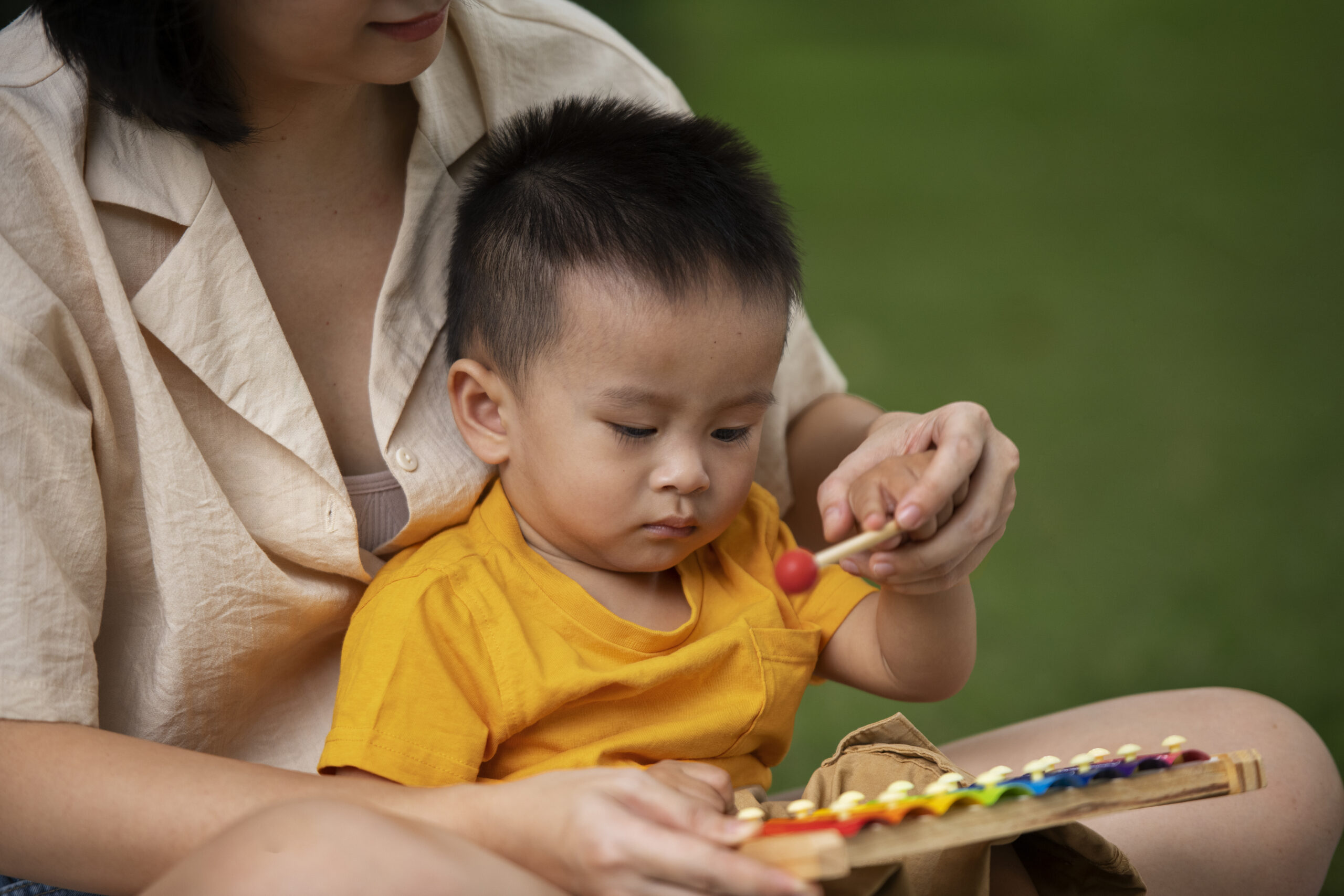 My Cart0
My Cart0

Does My Child Have Autism? Knowing Early Signs and Interventions
As a parent, it’s important to be aware of your child’s development, observing and celebrating every milestone they achieve. While every child progresses at their own pace, in some cases, children may show signs that suggest the presence of Autism Spectrum Disorder (ASD) that could affect their progress.
Early recognition of these signs is crucial, as early intervention could potentially improve outcomes for children with autism, enabling them to thrive. And by understanding the indicators and seeking professional guidance, you can have the tools and knowledge required to support your child in navigating the world grow into their full potential.
Exploring Autism Spectrum Disorder: What is Autism?
ASD is a complex neurodevelopmental condition that affects a person’s communication, behaviour, and social interaction. It manifests differently in each individual, creating a spectrum of challenges and strengths.
While some children with autism may have difficulties with verbal and nonverbal communication, others might exhibit exceptional talents in specific areas. From infancy through childhood, ASD can influence various aspects of development, including learning, social skills, and emotional regulation.
Recognising the Early Signs of Autism
Early detection of autism is critical for timely intervention and improved outcomes. If you suspect your child might be exhibiting signs of autism, don’t hesitate to seek professional guidance. A paediatrician or a specialist in child development can conduct comprehensive tests to determine if your child is on the autism spectrum. If a diagnosis is made, they will provide you with clarity and guidance on how to best support your child’s unique needs and development.
What Are the Main Signs of Autism?
- Delayed language development: Lack of babbling, pointing, or using single words by 16 months, or no two-word phrases by 2 years.
- Reduced social interaction: Limited eye contact, lack of response to their name, or difficulty initiating and maintaining social interactions.
- Repetitive behaviours: Hand-flapping, rocking, or insisting on sameness in routine or environment.
- Unusual sensory sensitivities: Over- or under-reactions to sounds, textures, tastes, or smells.
Regression as a Red Flag
Regression refers to the loss of previously acquired skills or backtracking on developmental milestones. This may represent autism onset in young children. For older children, this could be a sign of autistic burnout, wherein they may feel overwhelmed by a situation.
Identifying Autism in Young Children
Although autism can be diagnosed at any age, it is referred to as a “neurodevelopmental disorder” because typically, signs appear as early as the age of 2.
During the development of your baby or toddler, be vigilant of signs that could indicate that they have autism.
Early Signs of Autism in Babies and Toddlers
If you’re wondering what the main signs of autism in babies and toddlers are, these are some of the tell-tale signs:
- Limited eye contact and social smiling
- Preference for playing alone rather than engaging with others
- Lack of response to their name or parental attempts to interact
- Delayed babbling or pointing
- Repetitive movements or behaviours
Developmental Red Flags to Monitor
When your baby or toddler is not acquiring key developmental skills and hitting important milestones, this could be a sign they are autistic. Signs include:
- No big smiles or joyful expressions at 6 months
- No response to their name at 12 months
- No babbling or baby talk at 12 months
- No spoken words at 16 months
- No meaningful two-word phrases beyond imitation or repetition at 24 months
Recognising Autism in Older Children
As children grow, signs of autism may become more apparent and manifest in different ways, which could lead to some parents wondering whether their child is really autistic or just difficult.
However, it’s important to remember that autism presents differently in each individual, and early recognition can pave the way for appropriate support and intervention.
Here are some common signs of autism you should watch out for in both young boys and girls:
Social Challenges
- Difficulty making and keeping friends
- Struggling to understand social cues and nonverbal communication
- Preference for solitary activities over social interaction
- Difficulty understanding others’ perspectives and emotions
Language and Communication Barriers
- Delayed or atypical language development
- Repetitive use of language or echolalia (repeating words or phrases)
- Difficulty understanding figurative language or jokes
- Challenges with initiating or sustaining conversations
Nonverbal Communication Issues
- Limited use of gestures, facial expressions, or eye contact
- Difficulty interpreting others’ nonverbal cues
- Atypical body language or posture
Rigid Behaviour and Restricted Interests
- Insistence on sameness and routines
- Difficulty adapting to change
- Intense focus on specific interests or topics
- Repetitive behaviours or movements
Observable Repetitive Behaviours
- Hand-flapping, rocking, or spinning
- Lining up toys or objects
- Repeating phrases or sounds
- Fixations on specific parts of objects
Understanding the Causes of Autism
While the exact cause of autism remains unknown, research suggests that it could be caused by genetic and environmental factors:
- Genetic predisposition: Several studies indicate that rare gene changes or mutations are the cause of autism.
- Environmental factors: This includes babies born extremely premature or with very low birth weight, and birth complications that result in oxygen deprivation to the baby’s brain.
Taking Action if Autism Is Suspected
If you have concerns about your child’s development or suspect they might have autism, it’s crucial to be proactive. These are some of the things you can do to help your child with autism:
1. Consult Your Paediatrician
Share your observations and request an evaluation for developmental delays or autism. Early detection is key to improving outcomes. The earlier a diagnosis is made, the sooner your child can begin receiving tailored interventions and support. Your child’s paediatrician, especially those who specialise in developmental conditions, could also give you the knowledge and guidance you need to support your child with autism as they grow.
2. Seek Early Intervention Services
If your child receives an autism diagnosis, seek autism early intervention in Singapore without delay. Early intervention could make a difference in your child’s development, helping them acquire essential skills and address challenging behaviours. These autism therapy programmes often use evidence-based approaches like Applied Behavior Analysis (ABA) Therapy and Speech Therapy, which can be customised to address your child’s unique needs and goals.
3. Connect with Support Groups
Consider exploring support groups online or through local organisations. Connecting with support groups for parents of children with autism could give you an outlet to share your experiences. They could also be a way for you to receive emotional support from people who understand what you’re going through.
4. Educate Yourself About Autism
The more you know, the better equipped you’ll be to advocate for your child and make informed decisions about their care. Some of the ways you can inform yourself are by reading books, articles, and reliable online resources. You can also attend workshops and seminars conducted by autism organisations and professionals. The knowledge you gain could enable you to understand your child’s unique needs, navigate the complexities of the education system, and access appropriate resources and services.
Work with Professionals to Support Your Child with Autism
Navigating the complexities of autism requires a multi-faceted approach, and working with professionals can make a significant difference. At Exploring Mates, we know the importance of addressing autism-related challenges from an early age. That’s why we offer a range of early intervention services, including speech therapy and applied behavioural analysis, all aimed at fostering your child’s growth and development.
Additionally, we work closely with you to provide guidance and support in understanding autism and learning strategies to reinforce your child’s development at home. Our goal is to empower you with the knowledge and skills needed to advocate for your child and create a nurturing environment that promotes their well-being.
By collaborating with Exploring Mates, your child can receive comprehensive care tailored to their specific needs. Together, we can build a strong foundation for your child so that they can develop into their full potential in the long run.








